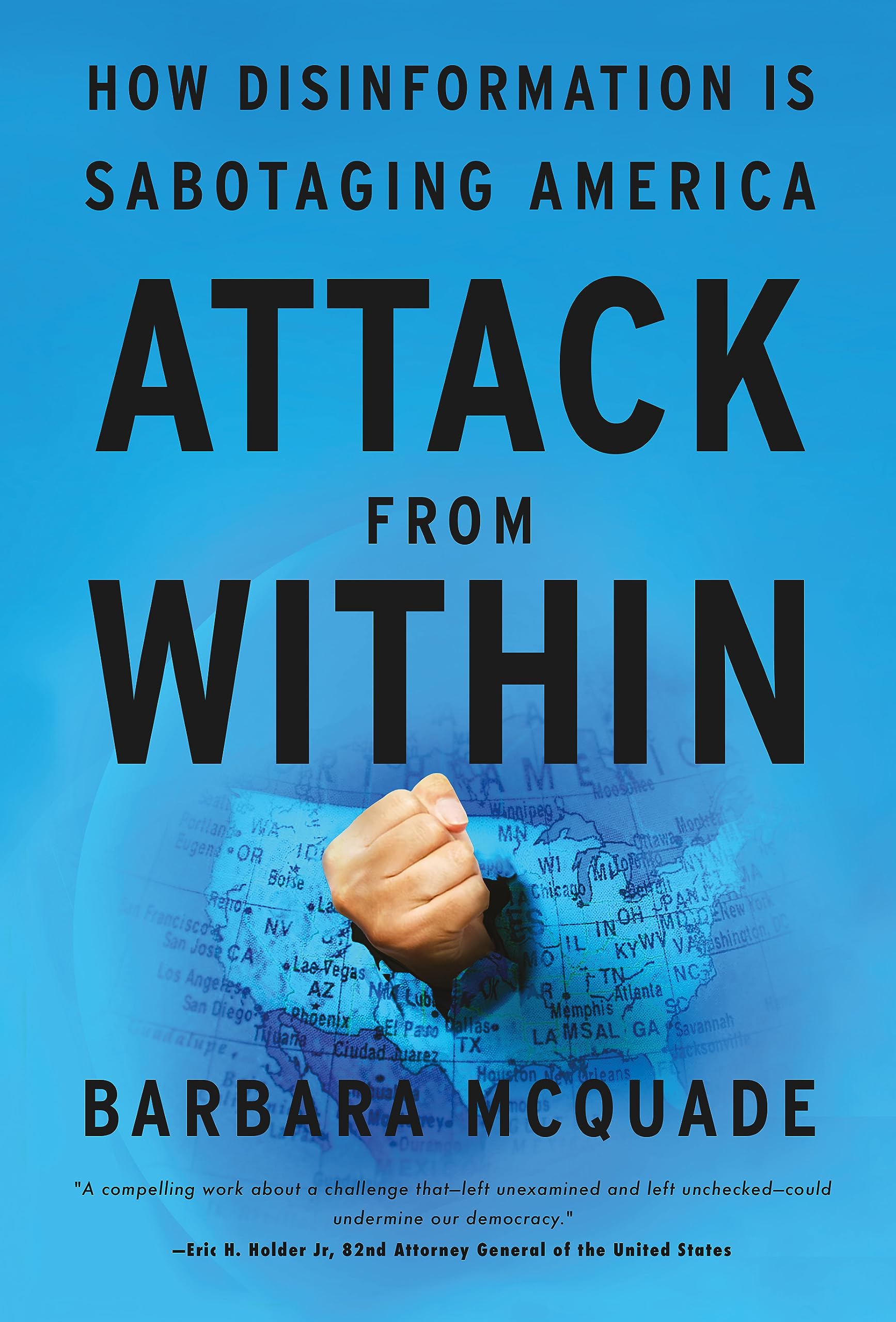
Attack from Within: How Disinformation Is Sabotaging America
Barbara McQuade
Questions & Answers
Disinformation undermines democracy and the rule of law by manipulating public perception, fostering distrust in institutions, and promoting division. It distorts truth, leading to the erosion of public confidence in elections, the media, and the judiciary. Authoritarians exploit this by:
- Manipulating Public Opinion: Through disinformation, they create a narrative that supports their agenda, often by exploiting fears and appealing to emotions over facts.
- Undermining Institutions: By discrediting the media, civil servants, and the judiciary, authoritarians weaken checks and balances, allowing them to consolidate power.
- Promoting Division: Disinformation exacerbates existing social and political divisions, making it easier for authoritarians to manipulate the populace.
Historical precedents for the use of disinformation by authoritarians include:
- Adolf Hitler: Used propaganda to promote his agenda, vilify opponents, and create a cult of personality.
- Joseph Stalin: Manipulated information to consolidate power, suppress dissent, and create a narrative of Soviet superiority.
- Benito Mussolini: Employed propaganda to promote Italian nationalism and his own authority, while suppressing opposition.
These historical examples illustrate how disinformation has been a tool for authoritarian regimes to undermine democracy and the rule of law.
Disinformers employ various tactics and strategies to spread misinformation. They exploit human psychology and technology in the following ways:
-
Appeal to Emotion: Disinformers use emotional manipulation, often appealing to fear, to evoke strong reactions and override rational thinking. They organize mass rallies and use symbols to foster a sense of belonging and loyalty.
-
Division and Scapegoating: They exacerbate societal divisions by demonizing and scapegoating certain groups, fostering a "us vs. them" narrative and reinforcing tribalism.
-
Misinformation Tactics: They use techniques like "destroying truth," "going big," "repeating lies," and "keeping the message simple" to manipulate public perception and undermine credibility.
-
Confirmation Bias: Disinformers prey on the human tendency to seek information that confirms pre-existing beliefs, reinforcing false narratives.
-
Technology Exploitation: They leverage technology, especially social media and AI, to amplify misinformation. AI can generate fake content and deepfakes, while social media algorithms can spread misinformation rapidly and virally.
-
Manipulation of Media: They control or influence media outlets to disseminate false information, creating echo chambers that reinforce their narratives.
By combining these tactics, disinformers effectively manipulate public opinion, undermine democratic processes, and erode trust in institutions.
The rise of new technologies, particularly AI and social media, has significantly exacerbated the spread of disinformation and its impact on democracy. AI, like ChatGPT, can generate convincing fake content, making it easier to create deepfakes and manipulate information. Social media platforms, with their vast reach and ease of use, allow disinformation to spread rapidly. These platforms often prioritize engagement over accuracy, leading to the spread of false narratives. Anonymity on these platforms enables the spread of misinformation without accountability. Additionally, algorithms can amplify content that generates outrage, reinforcing echo chambers and reinforcing existing beliefs. This combination of technology and human psychology creates an environment where disinformation can thrive, undermining the shared reality necessary for democratic governance.
The United States faces several challenges in dealing with disinformation. Its political and cultural context significantly contributes to its vulnerability:
-
Free Speech and Defamation Laws: The First Amendment's commitment to free speech and the high bar for defamation lawsuits make it difficult to deter false statements, allowing disinformation to spread unchecked.
-
Dark Money and Campaign Finance: The Citizens United decision has allowed for "dark money," which funds political ads without transparency, potentially influencing elections and promoting disinformation.
-
Digital Media Immunity: Digital media platforms enjoy immunity from lawsuits regarding content, fostering an environment where disinformation can thrive.
-
Cultural Divisions: The country's diverse regions and experiences lead to differing viewpoints, making it easier for disinformers to exploit existing divisions and fears.
-
Information Overload: The vast amount of information available online, combined with its immediacy, can overwhelm individuals, leading to reliance on trusted sources, which may be spreading disinformation.
-
Technological Advancements: Emerging technologies, like AI, can be weaponized for disinformation, creating more sophisticated and convincing false narratives.
-
Authoritarian Tendencies: The normalization of authoritarian tactics, such as vilifying opponents and promoting conspiracy theories, weakens democratic norms and makes the population more susceptible to disinformation.
To mitigate the spread of disinformation and protect democracy, several solutions and reforms can be implemented:
-
Amend Section 230: Modify the Communications Decency Act to hold online platforms accountable for the content on their platforms, while still protecting free speech.
-
Regulate Online Publishers: Treat social media platforms like utilities or natural monopolies, subjecting them to government regulation to protect public interests.
-
Prohibit Anonymous Users and Bots: Limit the spread of misinformation by requiring users to verify their identities.
-
Create a Code of Ethics: Encourage social media platforms to adopt voluntary codes of ethics that enforce community standards and flag false claims.
-
Improve Civic Engagement: Promote activities that encourage diverse perspectives and fact-based discussions, such as community groups and public forums.
-
Reform Campaign Finance: Increase transparency in campaign financing, particularly regarding dark money, to reduce the influence of money on politics.
-
Protect Election Machinery: Implement nonpartisan election administration and safeguard election machinery from manipulation.
-
Enforce Laws Against Paramilitary Activity: Use existing laws to address groups engaging in illegal activities, such as private militias.
-
Combat Corruption: Vigorously enforce laws against corruption to maintain the rule of law and ensure fairness in the criminal justice system.
-
Demand Leaders Who Speak the Truth: Elect leaders committed to truth and transparency, fostering an informed electorate.